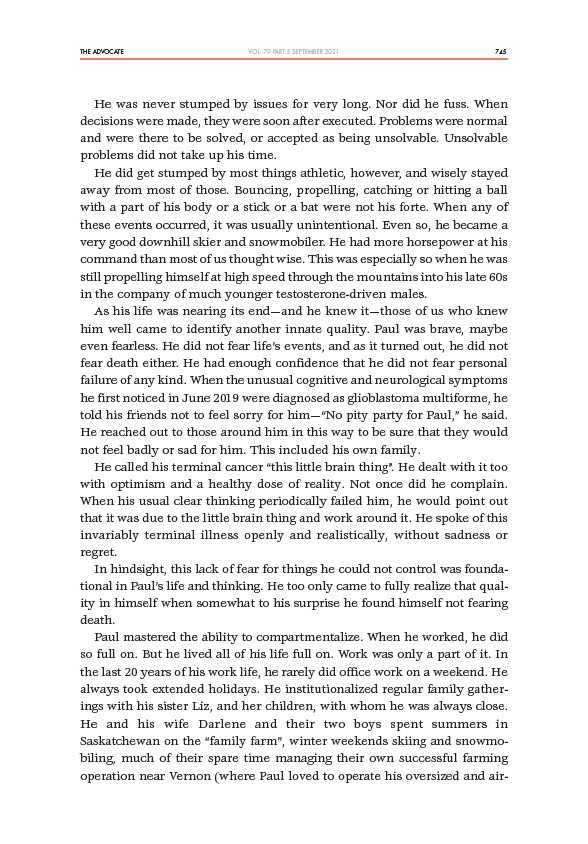
THE ADVOCATE 745
VOL. 79 PART 5 SEPTEMBER 2021
He was never stumped by issues for very long. Nor did he fuss. When
decisions were made, they were soon after executed. Problems were normal
and were there to be solved, or accepted as being unsolvable. Unsolvable
problems did not take up his time.
He did get stumped by most things athletic, however, and wisely stayed
away from most of those. Bouncing, propelling, catching or hitting a ball
with a part of his body or a stick or a bat were not his forte. When any of
these events occurred, it was usually unintentional. Even so, he became a
very good downhill skier and snowmobiler. He had more horsepower at his
command than most of us thought wise. This was especially so when he was
still propelling himself at high speed through the mountains into his late 60s
in the company of much younger testosterone-driven males.
As his life was nearing its end—and he knew it—those of us who knew
him well came to identify another innate quality. Paul was brave, maybe
even fearless. He did not fear life’s events, and as it turned out, he did not
fear death either. He had enough confidence that he did not fear personal
failure of any kind. When the unusual cognitive and neurological symptoms
he first noticed in June 2019 were diagnosed as glioblastoma multiforme, he
told his friends not to feel sorry for him—“No pity party for Paul,” he said.
He reached out to those around him in this way to be sure that they would
not feel badly or sad for him. This included his own family.
He called his terminal cancer “this little brain thing”. He dealt with it too
with optimism and a healthy dose of reality. Not once did he complain.
When his usual clear thinking periodically failed him, he would point out
that it was due to the little brain thing and work around it. He spoke of this
invariably terminal illness openly and realistically, without sadness or
regret.
In hindsight, this lack of fear for things he could not control was foundational
in Paul’s life and thinking. He too only came to fully realize that quality
in himself when somewhat to his surprise he found himself not fearing
death.
Paul mastered the ability to compartmentalize. When he worked, he did
so full on. But he lived all of his life full on. Work was only a part of it. In
the last 20 years of his work life, he rarely did office work on a weekend. He
always took extended holidays. He institutionalized regular family gatherings
with his sister Liz, and her children, with whom he was always close.
He and his wife Darlene and their two boys spent summers in
Saskatchewan on the “family farm”, winter weekends skiing and snowmobiling,
much of their spare time managing their own successful farming
operation near Vernon (where Paul loved to operate his oversized and air-